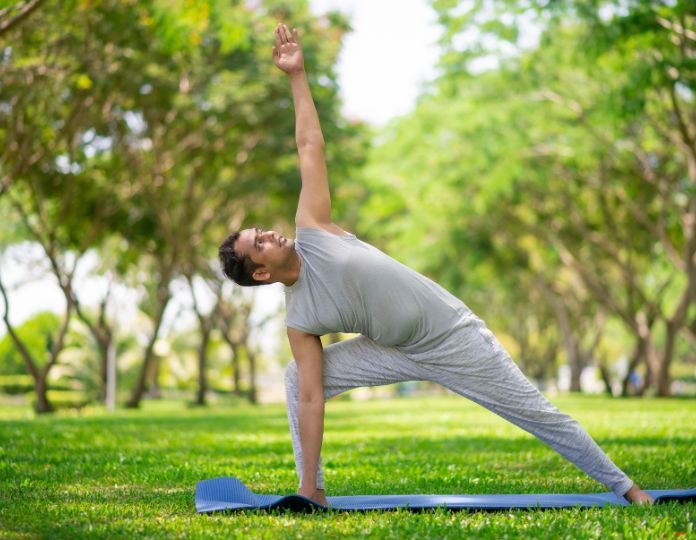Ever since the dawn of the pandemic and the lockdowns, people have been looking inward, figuratively, and quite literally. While the sudden hurdles that have knocked down billions of people around the globe need hardly be recounted, the toll that they have taken on the daily lifestyles of the average individual is less discussed. Even less seldom discussed is the sedentary routine that many of us have gradually come to adopt, where we have resorted to our beds and desks, paying no heed to our state of mind.
Related: The Heaviest Meditation
During the early months of 2020, most people were cooped up in their metaphorical cages as a quarantine measure, to prevent the spread of the virus. While they may or may not have been successful in avoiding contracting the infection, they would have been quick to realise that the world was no longer their oyster. No longer could they take their morning strolls on a whim, pay a surprise visit to their friends, or paint the town red. But no matter.
With the marvels of modern technology, one need hardly swipe a few times on their devices to watch a film, listen to music, videoconference their friends, and order food. It was a dream come true for introverts, revelling in their new reality of soaking in all of their solitude, and choosing if and when to participate in any form of human interaction. Extroverts fared less better, deprived of their opportunities to socialise, but they found their ways of restoring their batteries as well. It seemed that all was well, yet another testament to mankind’s ability to acclimatize to crisis.
Read more: A glance into the life of Introverts
But the seams had begun to fray, even if people did not know it yet. While lounging on the bed might well be most people’s idea of a good time, it appears that this is yet another activity best spent in moderation. Indeed, it is one thing to relax on the chair for a few hours after a long day of commute and the outdoors, and quite another to cohabit with a pillow.
A study by Ellingson and others in the year 2018 indicated that a sedentary lifestyle was associated with negative mental well-being, increasing the likelihood of developing anxiety, depression, as well as sleep disorders. It also referenced other studies that had observed that a reduction in one’s total sedentary time improved the mood, stress, and sleep of individuals.
Related: The science of sleep: what goes on in your brain when you sleep?
Research has also linked increased screen time to poor mental health in adolescents. Clearly, it is not the natural state of human beings to be immobile for long periods of time, even less so when it is accompanied by psychological disengagement as well. Evolution designed the human mind to be alert and the body to be agile, skulking in the tall grasses of the savannah while stalking beasts.
Related: Screen Apnea: Your Computer Screen Can Disturb Your Breathing

Clearly, it is not the natural state of human beings to be immobile for long periods of time, even less so when it is accompanied by psychological disengagement as well. Evolution designed the human mind to be alert and the body to be agile, skulking in the tall grasses of the savannah while stalking beasts. The early humans were hunter-gatherers, after all, requiring them to be swift on their feet and accumulate enough stamina to prowl through the forests for collecting wild berries.
Related: Understanding the Crucial Bond Between Mental and Physical Health
Nature could not have anticipated that humans would build self-sustaining units of shelter that made movement optional and a healthy choice rather than a necessity. Not many require a primer to understand how being seated or lying down most of the time contribute to obesity, cardiovascular diseases, and a number of physical ailments that increase fatality rates. The exacerbation of the body directly debilitates an individual’s state of mind as well. Without sufficient stimuli or opportunities to exercise one’s limbs, the mind is not prompted to utilise any of the resources at its disposal. Without achieving the state of flow, it has more to time to engage in rumination, and might well stagnate due to the monotony of existing within the same environment.
Related: Discovering Blissful Focus: Get into the Flow State
One might imagine the range of emotions and thoughts that the average mind expects to experience over a span of a week to be a pendulum: It swings gradually from one extreme to the other, and eventually rests in a state of equilibrium, upon which a state of tranquility may be derived. But with the absence of such motions, the resting position of the object that does not fluctuate either way elicits paralysis, and this position might well cause the mind to assume that the individual must be in pain, or wounded. Distractions don’t serve to trick the mind into believing that one’s optimal lifestyle consists of eating takeout food on the bed or fiddling with a joystick.
Related: Decoding the Food-Psychology: How Our Diet Shapes Our Emotions
The pendulum must swing before it settles. The most straightforward solution to combating such a sedentary lifestyle is to engage in productive activities, preferably outdoors so that one is not tempted by devices. It is the variable of screen-time more than most that is associated with the stationary routine, so it would be wise to substitute this with some other habit. It need not necessarily require swearing off electronic devices; one may begin by listening to a YouTube video rather than watching it, for a start.

Gradually, one may cultivate pastimes that are not immersive enough to ignore the sensation of one’s limbs becoming numb by the stillness. A breath of fresh air and the sensation of feet striking the earth is a very comfortable place for the mind to thrive, if only to reassure itself that the body is expending its energy towards a certain goal, and heading in a general direction.
Related: Mantra Meditation: A guide to Inner peace and Tranquility
Even if confinement to a certain setting is necessary, it helps to emulate an environment and a lifestyle that is more active than resting upon a mattress for most of the day. Physical exercise and yoga could still be performed indoors, and could go a long way towards maintaining the dexterity of one’s bones and muscles so that body aches are kept at bay.
Rejuvenating the body also enriches the mind. One might also develop hobbies that incorporate walking, or modify existing activities to include more motor movements. One need not exert oneselves to the point of exhaustion, however; as long as one’s head is tired enough to not dwell too much on thoughts, a healthy period of sleep could be attained, and this in turn would allow one to lead a meaningful day on the next. Standing up for oneself has hardly ever been a healthier habit.













Leave feedback about this